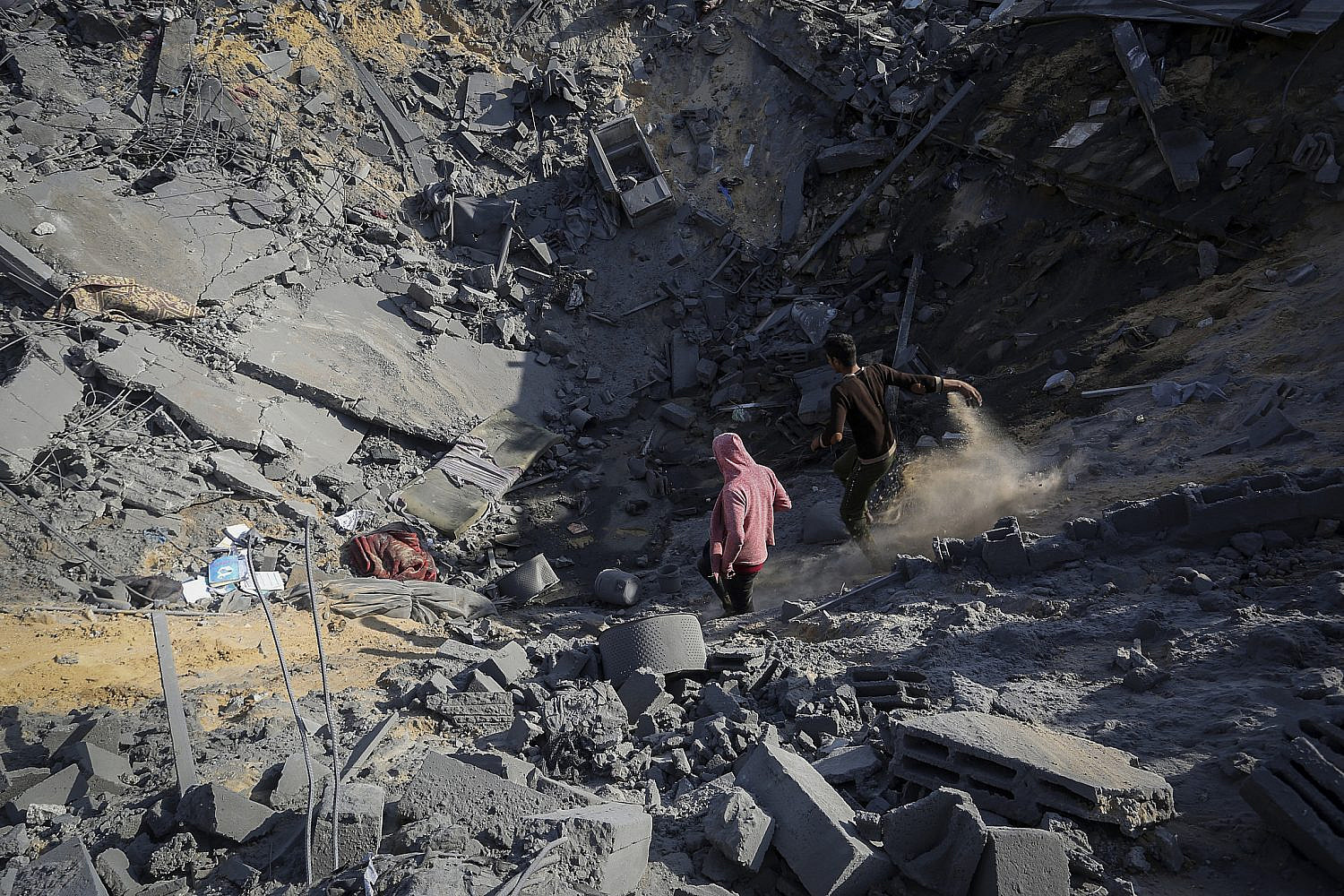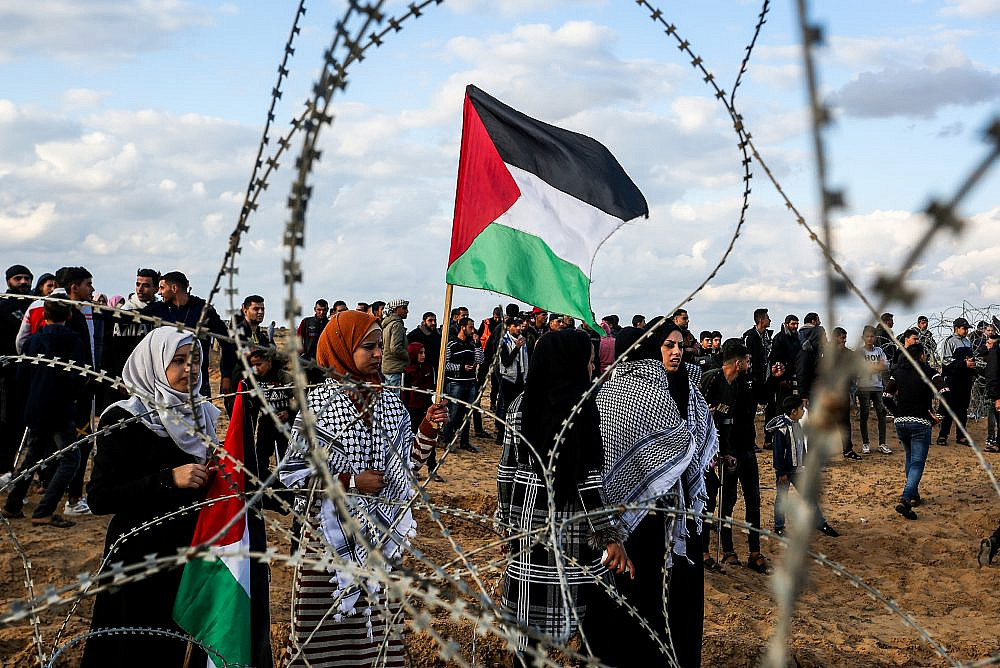“We, Israelis and Palestinians, those who live between the river and the sea, deserve to live here in peace and equality, with no discrimination or oppression of any kind.”
This declaration, written by 25-year-old Palestinian journalist Ahmed Alnaouq, who lives in Gaza, accompanied the launch of a new Hebrew-language website, We Beyond the Fence. The site, which provides Israeli readers with articles, poems, and personal essays about life in the Gaza Strip, is jointly-run by Alnaouq and Yuval Abraham, 25, a student and activist from Jerusalem. We Beyond the Fence is run from the strip and offers a platform for young Palestinians to share their stories of life under siege. The work, which is translated by a group of Israelis, draws from the English-language website, We Are Not Numbers.
Alnaouq’s statement continues: “My name is Ahmed and I live in Gaza. This year I celebrated my 25th birthday. I work as a journalist for a Palestinian media outlet published in Gaza. Young people such as myself — journalists, poets, authors — decided to translate our texts to Hebrew. We want our voices to reach you directly, without filters, out of a sense that Gaza is represented in the Israeli media in a shallow way.
“I hope that the translations of these articles will raise your awareness over what is happening over here, for the people who are living beyond the fence — and I hope that we will be able to promote peace between our nations and change the policies that keep us in conflict with each other. The time has come to replace the years-long siege on Gaza, the restriction on movement, and the military regime in the West Bank with a new policy of democracy and full equality between the two peoples.”
These paragraphs tell you everything you need to know about We Beyond the Fence, which launched at the end of December. Following more than a decade of siege — which has turned the strip into a closed-off ghetto of ruin and distress, while erasing the voices of Palestinians living there from the Israeli consciousness — the site is an exciting attempt to break through the wall of silence around Gaza and talk about what is actually happening there.
Abraham himself is experienced in breaking down walls, both mental and concrete, between the two sides. Four years ago, he decided to study Arabic, which he says changed his entire understanding and experience of this country.
How does a young Israeli come to meet a young person from Gaza? In the current reality it sounds almost imaginary.
“Honestly, it all happened thanks to Facebook. I already knew We Are Not Numbers. Every article published there links to the author’s personal Facebook page. I contacted some of the authors two years ago for a story I did on Israel Social TV.
“I met Ahmed half a year ago when I interviewed him for a different story and we became fast friends. He told me that he manages We Are Not Numbers and wanted to translate the texts to Hebrew in order to give exposure to the voices he hears every day. That’s how it started. I wrote a Facebook status three months ago in which I asked if people would be willing to volunteer to translate these voices, and within two hours 130 people had volunteered.
“I often think about why so many people volunteered. Perhaps because translation is seen as a less subversive act. Not all of the volunteers come from activist circles; most joined out of a feeling that there is such a strong separation, especially from Gaza, due to the policies of blockade, and they want to do something about it. For many of them it was the first time they were exposed to the worldview and narrative of Palestinians from Gaza, and it was challenging for them. When you translate, you are forced to delve into the text, since the voice of the text is actually coming from your mouth. It’s very significant.”
“Yuval called me one day to talk about a story he did about the Israeli elections and the response to them in Gaza,” says Alnaouq. “I told him that we Palestinians need to try and change the way Israelis see us, since some Israelis think that Gaza is a center of terrorism and all Gazans are terrorists, and that influences the way they choose their leadership, which then adversely affects us. That’s how the idea to translate the articles was born … to explain to [Israelis] the injustice that the Israeli government is committing against us.
“At the end of the conversation, he said he’d be willing to cooperate, and we thought the right thing would be to launch a Hebrew-language site that presents these stories.”
Were you surprised?
“Yes, and I’m still surprised, because I thought all Israelis hate Gazans or are apathetic to their fate,” Alnaouq says. “But then I saw how many of them are willing to volunteer to translate our voices. It says that we have hope that one day we’ll be able to change reality.”
Alnaouq, who is currently in London completing a master’s degree in journalism, is one of the founders of We Are Not Numbers. It was a personal tragedy that pushed him to start that site.
“We Are Not Numbers began after the last war in Gaza in 2014, when Israel killed my brother and some of my friends in air strikes. After that, I sunk into deep depression and lost the will to live. At the same time my friend, an American journalist, asked me to write a story about my brother and how his death affects my life and my family. It was published in many places, and that’s how the idea to create a platform for young people from Gaza to tell their stories in English was born. We connect young people here to English speakers around the world who take them under their wing and help them write their story.
“Our policy at We Are Not Numbers is that anyone who wants to translate those articles into any language is welcome to do so without asking for permission — as long as they mention the original. We told the writers about translating their work into Hebrew. It was strange to them, but most of them were excited and agreed.”
What is the most important thing that Israelis don’t understand about Gaza?
Alnaouq: “The most important thing is that they understand that we are not terrorists and we do not want to kill Israelis. Gazans don’t hate Israelis, and we certainly don’t hate Jews. It’s a terrible mistake to think this way. We have nothing against Israelis. We are very opposed to your government’s racist apartheid policies, which violate so many of our rights. We need to end this conflict already, and fast. We’re so exhausted.”

Among the potential readers might be the pilot who killed your brother.
“I’ve thought about this many times. Right after the war I thought “there is a pilot who killed my brother. But the pilot didn’t kill my brother. What killed my brother was hatred, racism, and Israel’s policies. I have nothing against this pilot specifically, I have a lot against Israel’s leaders who insist on violating our human rights. If we ever succeed in ending this apartheid, I won’t have anything those who carried out these violations. People do horrific things to each other in wars, but at the end of the day we need to end this thing. For everyone’s sake.”
“It demands a lot of bravery in many respects, including the very fact of cooperation with me,” says Abraham about his partner. “The gap in power is so big between myself and Ahmad that his willingness to cooperate reflects a real belief in a shared vision. That’s admirable.”
Do you really believe that the Israeli public is even willing to listen to the voices of these young people from Gaza?
Abraham: “Maybe we’re young and naïve. Maybe in five years we’ll say we tried and gave up. But I feel that something in this bi-national conversation of partnership has a kind of power. I haven’t yet given up. Even small changes are okay. I am already seeing responses by people who read the texts and say they were deeply affected by them.”
What resonated most with you in these texts?
“The personal texts; when someone describes what he is seeing in first-person. One of the texts that most touched me was by someone who was 15 years old during the last war. She describes how she was lying in bed next to her younger sister and looking through a cracked window at the sky, while her sister counts the Israeli jets passing overhead. Then they hear on the radio that one of their relatives was killed in an airstrike and their dad leaves them. She describes how she felt about suddenly becoming the mother. It’s a horrifying text that I keep thinking about.”
Do you ever imagine yourself visiting?
“Of course, I have a ton of friends there. It’s so close, 1.5 hours from Jerusalem. If I could I would hop in my car and drive there tomorrow. I hope that in the future I’ll be able to go there, and Ahmed will be able to visit Jerusalem. He dreams about doing so.
“If I ever go to Gaza, I’ll probably head for the beach. I hear it’s really nice. I also have a friend who organizes poetry gatherings. Maybe I’d go to that.”
This piece was originally published in Hebrew on Local Call. Read it here.



